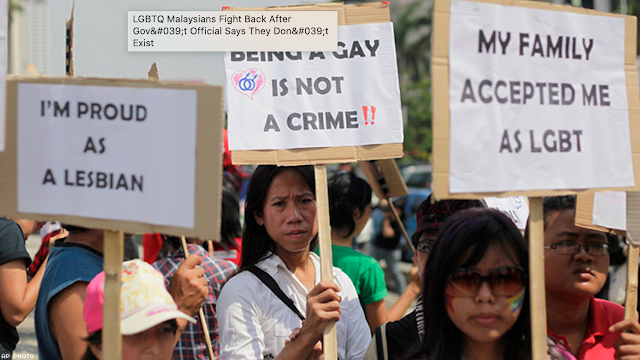BY NICO LANG
MARCH 07 2019 4:41 PM EST
“I don’t know why I was shocked.”
Harjinder Kier, a nonbinary advocate and conservationist, says after another exhaustingly long day— one of many for Malaysia’s queer and trans community in recent months. On Tuesday, the country’s tourism minister, Datuk Mohamaddin bin Ketapi, claimed there are no LGBTQ people in Malaysia.
“I don't think we have anything like that in our country,” Mohammaddin told the German broadcaster Deutsche Welle during the ITB Berlin travel conference.
The minister had reportedly been asked if Malaysia was “safe” for LGBTQ people and Jews following recent attacks on minority communities. Last August, 20 people were arrested in a raid on the gay nightclub Blue Boy in Kuala Lumpur. Malaysian officials hoped the attack would stop LGBTQ culture “from spreading into our society.”
Multiple transgender women have been beaten by violent mobs or killed amid a countrywide surge in violent anti-LGBTQ hate crimes.
At the time of publication, the post has amassed hundreds of “likes” and dozens of comments in support of LGBTQ Malaysians.
Although Harjinder said the comments weren’t surprising after Malaysian Prime Minister Mahathir bin Mohamad controversially referred to LGBTQ rights as “Western values” in October, she claimed the “level of dismissal” hit her hard.
“It’s hard enough to exist as an LGBTQ person in this country, especially for our trans sisters and brothers,” Harjinder stated in an email to The Advocate.
The post was for people to “see that we are here and not scared to show it,” she added.
Harjinder’s frustrations were shared by many in Malaysia’s LGBTQ community, who have increasingly been singled out by their own government for scorn and ridicule.
Numan Afifi, president of the Pelangi Campaign, claimed the tourism minister’s comments would further contribute to a culture in which LGBTQ Malaysians are “stigmatized, discriminated, and criminalized” for who they are or who they love.
“Erasure of our existence will not only just trivialize our struggle, but also perpetuate the injustices towards us,” he told The Advocate.
Homosexuality is punishable by up to 20 years in prison under the Malaysian Criminal Code, which forbids “gross indecency with another male person.” Other penalties include fines or corporal punishment. Two women accused of “attempting” lesbian sex in the Malaysian state of Terengganu were caned in September as 100 people watched.
Just months before the public flogging, officials in conservative Terengganu announced the formation of a conversion therapy program for trans women.
While last year’s general elections promised to bring a wave of sweeping reforms to Malaysia, the so-called Democratic revolution of May 2018 has yet to result in changes regarding the treatment of LGBTQ people, said Amnesty International Malaysia's Nisshanthan Dhanapalan.
“We are closing in to one year since the new government has come into power,” he told The Advocate. “By denying the existence of LGBTQ individuals, they are [making us] susceptible to abuse, harm, and danger.”
Anthony Chong, an advocate for Malaysia’s queer deaf community, said the continued marginalization of LGBTQ people is an “embarassment.”
“Minority communities — not only LGBTQ people but also people with disabilities and indigenous people — are ashamed at how our ministers run our government,” he told The Advocate. “They think they know better than any of us about our lives, but the fact is they do not. They knew nothing or little about us.”
“They do not represent the country I know,” he added.
The Malaysian government has already begun to backtrack on Mohammaddin’s remarks following international backlash. In a statement, the tourism ministry said the country “has never and will not do anything to stop our guests based on their sexual orientation, religion and cultural belief.”
In a tweet, Mohammaddin asserted that Malaysia would not discriminate against tourists “based on their sexual orientation, religion, and cultural practices.”
Malaysia’s government hopes to attract 30 million foreign tourists this year.
But as the majority-Muslim nation of 32 million people continues to struggle with inclusion, the LGBTQ community will keep fighting against erasure.
Activist Pang Khee Teik was one of several prominent LGBTQ figures whose portraits were removed from an art exhibit on the Malaysian island of Penang last year. Islamic Affairs Minister Mujahid Yusof Rawa claimed the government could not “accept” promotion of the LGBTQ community “because that is against the society norms.”
“When you put the picture with the [Pride] symbol, if that is not promotion... then tell me what is the definition of promotion?” Mujahid said of Pang’s photo, in which he poses with both a rainbow flag and a Malaysian flag.
Pang suggested officials like Mujahid and Mohammaddin watch a recent video posted to Queer Lapis, a website founded to tell the stories of LGBTQ Malaysians. Recorded during a workshop presentation, the features photos of the community in its full vibrancy: surviving in the face of challenges to their very existence.
“This video is proof that we exist,” he told The Advocate. “We are Malaysian citizens. They cannot erase our lives, our contributions, and our dreams to make this country better.”
Published on https://www.advocate.com/world/2019/3/07/lgbtq-malaysians-fight-back-after-govt-official-says-they-dont-exist (7 March 2019)


No comments:
Post a Comment